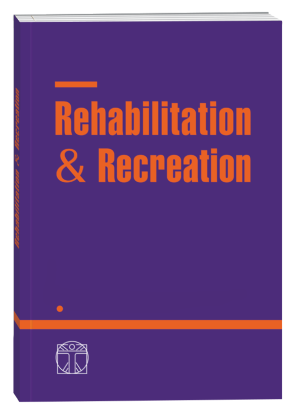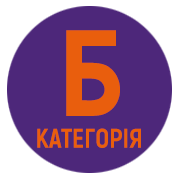ENSURING THE PROCESS OF REHABILITATION OF MILITARY PERSONNEL WHO LOST THEIR VISION AS A RESULT OF HOSTILITIES
DOI:
https://doi.org/10.32782/2522-1795.2024.18.3.6Keywords:
rehabilitation, areas of rehabilitation, comprehensive rehabilitation, military personnel with visual impairments, limitations of life activitiesAbstract
The article presents a theoretical overview of current approaches to the rehabilitation of military personnel who have suffered partial or complete loss of vision as a result of combat operations. Damage to the organ of vision as a result of the use of various types of weapons is one of the first among all combat injuries, which leads to further disability of both military and civilians. Objective – to present the experience of the educational and rehabilitation center “Trinity Hub” in Kyiv in providing rehabilitation assistance to military personnel who have suffered visual impairment as a result of hostilities; to identify the main tasks and characterize the activities of specialists in the process of implementing the rehabilitation program “Reboot”. Materials. The study used the analysis, generalization and synthesis of the results obtained from the study of scientific and methodological literature and the study of the experience of specialists in the provision of rehabilitation services at the Trinity Hub Educational and Rehabilitation Center. Results. The results of the theoretical study showed that rehabilitation for visual impairment is considered as an interdisciplinary continuous process. Specialists in the fields of health care (ophthalmologists, optometrists, physical therapists, occupational therapists, psychologists and other specialists), education (tyflopedagogues, instructors in spatial orientation and mobility, rehabilitation teachers and others), and social work are involved in the development and implementation of an individual rehabilitation program. The main areas of rehabilitation services at the Trinity Hub Educational and Rehabilitation Center in the process of implementing the rehabilitation program “Reboot” with military personnel who lost their vision as a result of hostilities were identified: psychological support; life skills training; training in spatial orientation and mobility; Braille training; digital skills training (non-visual use of sensory devices by people with profound visual impairments); physical therapy. The basic principles of providing rehabilitation services to military personnel with partial and complete vision loss are defined: personality-oriented approach, interdisciplinary approach, corrective orientation of rehabilitation processes; motivation to undergo rehabilitation; creating an atmosphere of comfort and mutual assistance; practical orientation of the rehabilitation process; the principle of “equal to equal”. Conclusions. The findings emphasize the need to involve both medical and non-medical specialists in the rehabilitation of persons with visual impairments. This approach will ensure maximum restoration of functional capacity and improve the quality of life of military personnel who have suffered visual impairment as a result of combat operations.
References
Абдряхімов Р. Оцінка якості життя комбатантів із клінічними проявами посттравматичного синдрому й частковою втратою зору внаслідок бойової травми. Медицина сьогодні і завтра. 2019. № 2 (83), С. 33–42. https://doi.org/10.35339/msz.2019.83.02.04.
Вдовіченко О., Соколова І., Педченко О., Степанова С., Фролова О. Психологічна реабілітація і супровід ветеранів війни: досвід Ізраїлю. Zeszyty Naukowe Wyższej Szkoły Technicznej w Katowicach. 2023, № 16. С. 107–118. https://doi.org/10.54264/0066.
Гребенюк Т. Реабілітація людей з порушеннями зору: аналіз ситуації. Матеріали Міжнародного проєкту «Підтримка реабілітації людей з інвалідністю, які отримали травми внаслідок війни». 2023. 56 с. URL: https://www.undp.org/uk/ukraine/publications/reabilitatsiya-lyudey-zporushennyamy-zoru-analiz-sytuatsiyi.
Гребенюк Т., Сасіна І., Свєт Є. Реабілітація людей з порушеннями зору: огляд моделі. Матеріали Міжнародного проєкту «Підтримка реабілітації людей з інвалідністю, які отримали травми внаслідок війни». 2023. 26 с. URL: https://www.undp.org/uk/ukraine/publications/reabilitatsiya-lyudey-zporushennyamy-zoru-ohlyad-modeli.
Імас Є., Лукасевич І. Спортивно-реабілітаційний компонент реалізації стратегії адаптації ветеранів до соціального та економічного життя в Україні. Спортивна медицина, фізична терапія та ерготерапія. 2024, № 1. С. 195–200. https://doi.org/10.32652/spmed.2024.1.195-200.
Коробкова Ю., Тонкоплей Ю. Корекція супровідних вегетативних станів слабозорих осіб засобами фізичної терапії та ерготерапії. Український журнал медицини, біології та спорту. 2020, Том 5, № 2 (24). С. 139–146. https://doi.org/10.26693/jmbs05.02.139.
Костенко Т. Психологічні аспекти підготовки до орієнтування в просторі незрячих дітей та з порушеннями зору. Освіта осіб з особливими потребами: шляхи розбудови. 2019, № 1(15). С. 163–173. https://doi.org/10.33189/epsn.v1i15.19.
Крук І., Григус І. Сучасний погляд на психологічну реабілітацію військовослужбовців з посттравматичним стресовим розладом. Rehabilitation and Recreation. 2023, № 15. С. 50–56. https://doi.org/10.32782/2522-1795.2023.15.6.
Програма розвитку ООН в Україні. Огляд ситуації з реабілітації людей з порушенням зору в Україні. Київ, 2023. URL: https://www.undp.org/uk/ukraine/publications/ohlyad-sytuatsiyi-z-reabilitatsiyi-lyudey-zporushennyam-zoru-v-ukrayini.
Сасіна І., Гребенюк Т. Формування життєвої компетентності осіб з порушеннями зору в процесі соціальної реабілітації. Формування життєвої компетентності осіб з особливими освітніми потребами в системі позашкільної, спеціальної та інклюзивної освіти : збірник наукових праць за матеріалами Всеукраїнської науково-практичної конференції. Харків, 2023. С. 210–213. URL: http://enpuir.npu.edu.ua/handle/123456789/39520.
Сасіна І., Гребенюк Т., Медведок Л. Ключові положення міжнародної політики щодо реабілітації осіб з обмеженнями повсякденного функціонування. Науковий часопис Національного педагогічного університету імені М.П. Драгоманова. Серія 19: Корекційна педагогіка та спеціальна психологія. Київ, 2023. Вип. 44. С. 73–82. URL: http://enpuir.npu.edu.ua/handle/123456789/41793.
Сасіна І., Паламар О., Гребенюк Т., Купріянова Т., Медведок Л. Удосконалення системи соціально-психологічної реабілітації військовослужбовців, які отримали порушення зору внаслідок бойових дій. Науковий часопис НПУ імені М.П. Драгоманова. Серія 5: Педагогічні науки: реалії та перспективи. Київ, 2022. Вип. 88. С. 177–181. https://doi.org/10.31392/NPU-nc.series5.2022.88.35.
Сасіна І.О., Гребенюк Т.М., Свєт Є.О., Костенко Т.М., Лукасевич І.І. Основи реабілітації людей з порушеннями зору. Київ, 2024. 115 с.
Скоропліт С., Михневич К., Замятін П., Хорошун Е., Борода В., Тертишний С., Замятін Д., Чеверда В. Особливості сучасної бойової травми та організації медичної допомоги. Харківська хірургічна школа. Харків, 2022. № 6 (117). С. 51–63. https://doi.org/10.37699/2308-7005.6.2022.10.
Godier-McBard L.R., Castle C.L. Heinze N., Hussain S.F., Borowski S., Vogt D.S., Gomes R.S. & Fossey M. A preliminary investigation of the wellbeing of visually impaired ex-service personnel in the United Kingdom. British Journal of Visual Impairment, 2022. 40(2), 274–288. https://doi.org/10.1177/0264619620973683.
International Committee of the Red Cross. Blast Trauma Care : Course Manual. 2022. 164 p. URL: https://shop.icrc.org/blast-traumacare-course-manual- pdf-ua.html.
International Vision rehabilitation standards: National Pole of Services and Research for the Prevention of Blindness and Vision Rehabilitation. 2022. URL: https://polonazionaleipovisione.it/wp-content/uploads/2022/07/International-Vision-Rehabilitation-Standards.pdf.
Kostenko T., Petrykina A., Los O., Legkiy O., Palamar O., & Popovych I. Psychological and pedagogical experiment of research into the rehabilitation impact of typhlo devices on the formation of people with visual impairments. Amazonia Investiga, 2022. 11(52), 175–185. https://doi.org/10.34069/AI/2022.52.04.19.
Stevelink S.A., Malcolm E.M., & Fear N.T. Visual impairment, coping strategies and impact on daily life: a qualitative study among workingage UK ex-service personnel. BMC public health, 2015. (15), 1–7. https://doi.org/10.1186/s12889-015-2455-1.
Synova I., Tarasun V., Sasina I., Grebeniuk T. & Glushenko K. Study of the Characteristic Mental Development Features of Primary School Students with Visçion Impairments. Journal of Intellectual Disability – Diagnosis and Treatment, 2021. 9 (5), 504–513. https://doi.org/10.6000/2292-2598.2021.09.05.9.
Downloads
Published
How to Cite
Issue
Section
License
Copyright (c) 2024 Т. М. Гребенюк, І. О. Сасіна, І. І. Лукасевич

This work is licensed under a Creative Commons Attribution-NonCommercial-NoDerivatives 4.0 International License.











